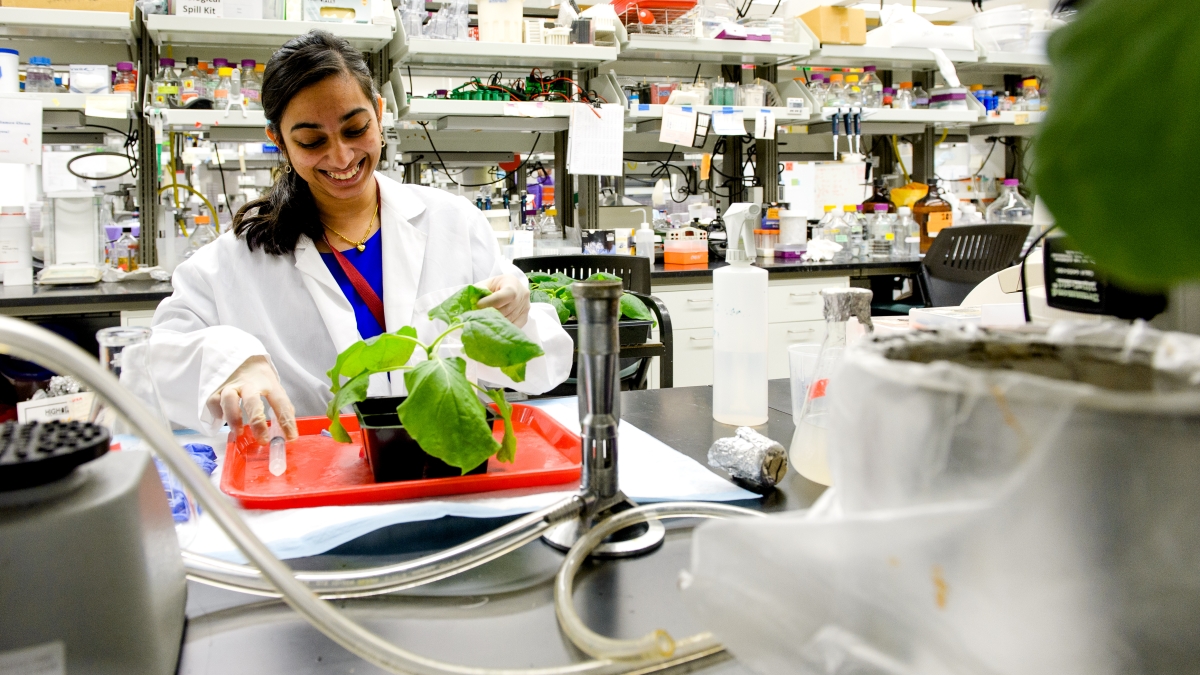New ASU scholarship program helps transfer students LEAP into science

A new ASU scholarship program will provide $600,000 in scholarships to transfer students in science over the next five years. Photo: Andy DeLisle
When community college transfer students start taking courses at a larger, more complex university setting, they face a variety of challenges. Navigating a new campus, succeeding in larger classes and securing undergraduate research opportunities can be daunting.
But Arizona State University is launching a new scholarship program aimed specifically at helping transfer students get involved in undergraduate research — something that increases a student’s chances of being accepted into medical and graduate schools.
“We found that transfer students are not participating in undergraduate research as much as students who start their college experience at ASU,” said Sara Brownell, assistant professor with ASU’s School of Life Sciences and primary investigator for a new grant funding the program. “This is a problem because undergraduate research can provide students with a unique opportunity to learn how to conduct research. We also know participation in research as an undergraduate helps students secure their futures beyond earning a bachelor’s degree.”
The National Science Foundation is providing $1 million to establish a new scholarship program at ASU called the LEAP Scholars program, which will provide $600,000 in scholarships to transfer students in science over the next five years.
As LEAP Scholars, students will learn about research, conduct research in a faculty member’s research lab and present their research findings to the community. Incoming transfer students from community colleges who demonstrate academic success, financial need and intend on majoring in degrees offered by ASU’s School of Life Sciences, School of Molecular Sciences, School of Earth and Space Exploration, or Department of Physics, are eligible for the program.
The scholarships are meant to increase the number of transfer students conducting research by helping to offset their need to work while going to college.
“We know that transfer students are often working at the same time they are attending school and that frequently means they don’t have time for research. This scholarship program is meant to help students alleviate their need for an off-campus job so that they can instead focus on doing research,” added Brownell, director of the LEAP Scholars program.
This scholarship program is the first program specific to transfer students, a group that ASU’s College of Liberal Arts and Sciences is particularly interested in helping. A recent college-wide initiative called Transfer Matters highlighted concerns for transfer students and identified possible solutions to identified issues. This scholarship program stemmed from one of those recommendations.
LEAP Scholars program manager Katelyn Cooper said there is a real need for scholarships directed to transfer students.
“Until this program, we did not have any scholarships programs that were specifically focused on transfer students interested in research, even though transfer students make up more than 40 percent of the students who graduate with a bachelor’s degree in the School of Life Sciences. This meets a huge need,” Cooper said.
For more information about the LEAP Scholars Program, visit https://sols.asu.edu/research/research-scholarships-transfer-students or contact katelyn.cooper@asu.edu.
More Science and technology

Turning up the light: Plants, semiconductors and fuel production
What can plants and semiconductors teach us about fuel production?ASU's Gary Moore hopes to find out.With the aim of learning how…

ASU technical innovation enables more reliable and less expensive electricity
Growing demand for electricity is pushing the energy sector to innovate faster and deploy more resources to keep the lights on…

What do a spacecraft, a skeleton and an asteroid have in common? This ASU professor
NASA’s Lucy spacecraft will probe an asteroid as it flys by it on Sunday — one with a connection to the mission name.The asteroid…

